NRSG139 Assignment 2: Reflecting on Health Assessment Skills
VerifiedAdded on 2022/07/28
|7
|1545
|38
Report
AI Summary
This report presents a student's reflection on their health assessment learning experience during the first semester of a nursing program, specifically within the NRSG139 course. The reflection utilizes Gibbs' Reflective Cycle to analyze the student's experiences with health interviewing, focusing on the application of the Australian Nursing Standard Assessment Tool (ANSAT). The student describes the process of interviewing an Indigenous Australian patient, detailing feelings of nervousness and the importance of establishing trust and cultural sensitivity. The evaluation section highlights the importance of comprehensive patient assessment, including family background and social connections, and the need to consider ethical aspects. The analysis section acknowledges the guidance of a supportive mentor and the importance of integrating theoretical knowledge into practice, addressing NMBA nursing code of conducts. The conclusion emphasizes the value of classroom learning and the identification of areas for improvement, such as refining interview questions and enhancing patient interaction. The action plan outlines the student's commitment to further research, addressing mentor feedback, and building confidence for future clinical practice. The report demonstrates the student's growth in critical thinking, clinical reasoning, and clinical judgement, as required by the assignment brief.
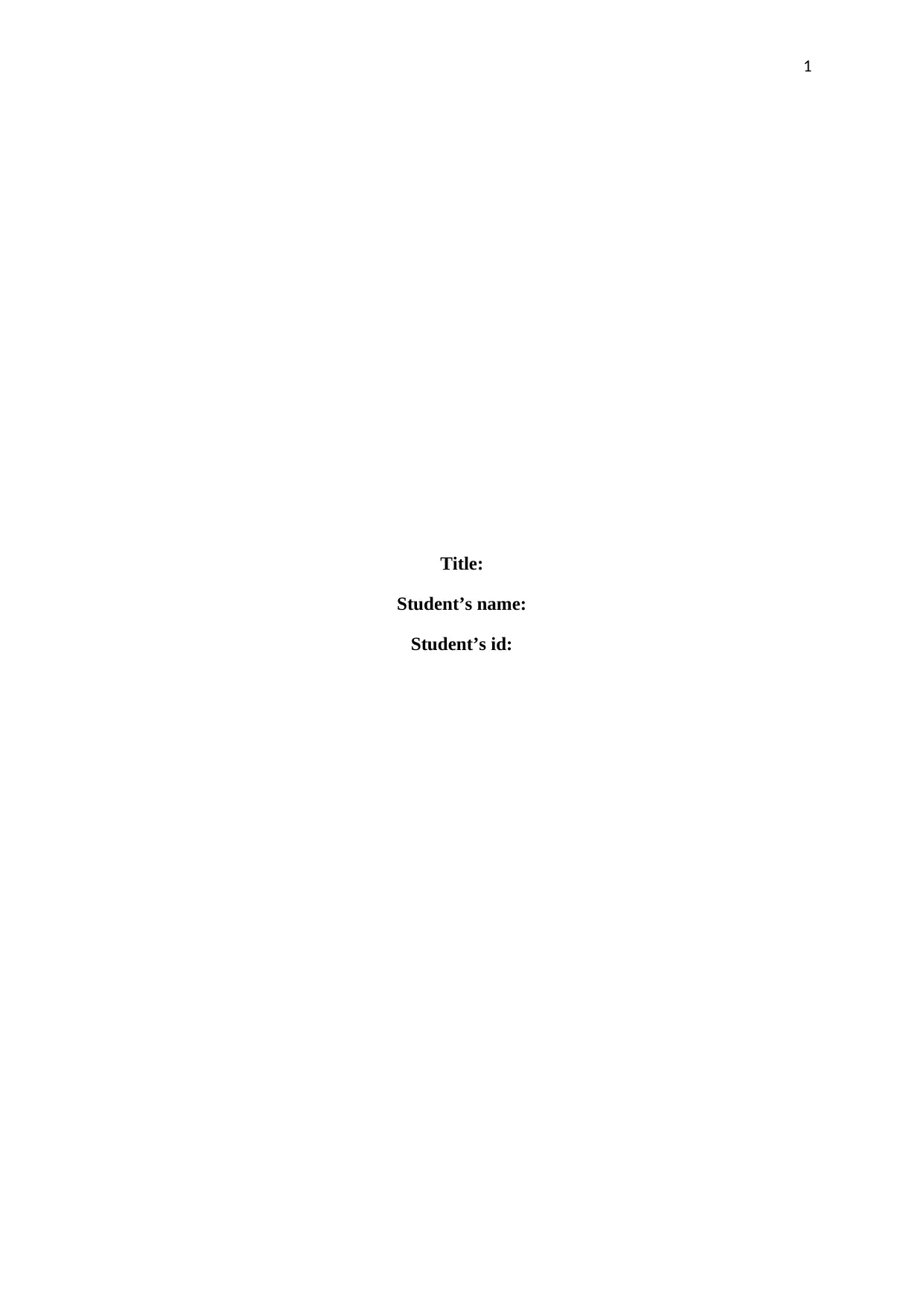
1
Title:
Student’s name:
Student’s id:
Title:
Student’s name:
Student’s id:
Paraphrase This Document
Need a fresh take? Get an instant paraphrase of this document with our AI Paraphraser
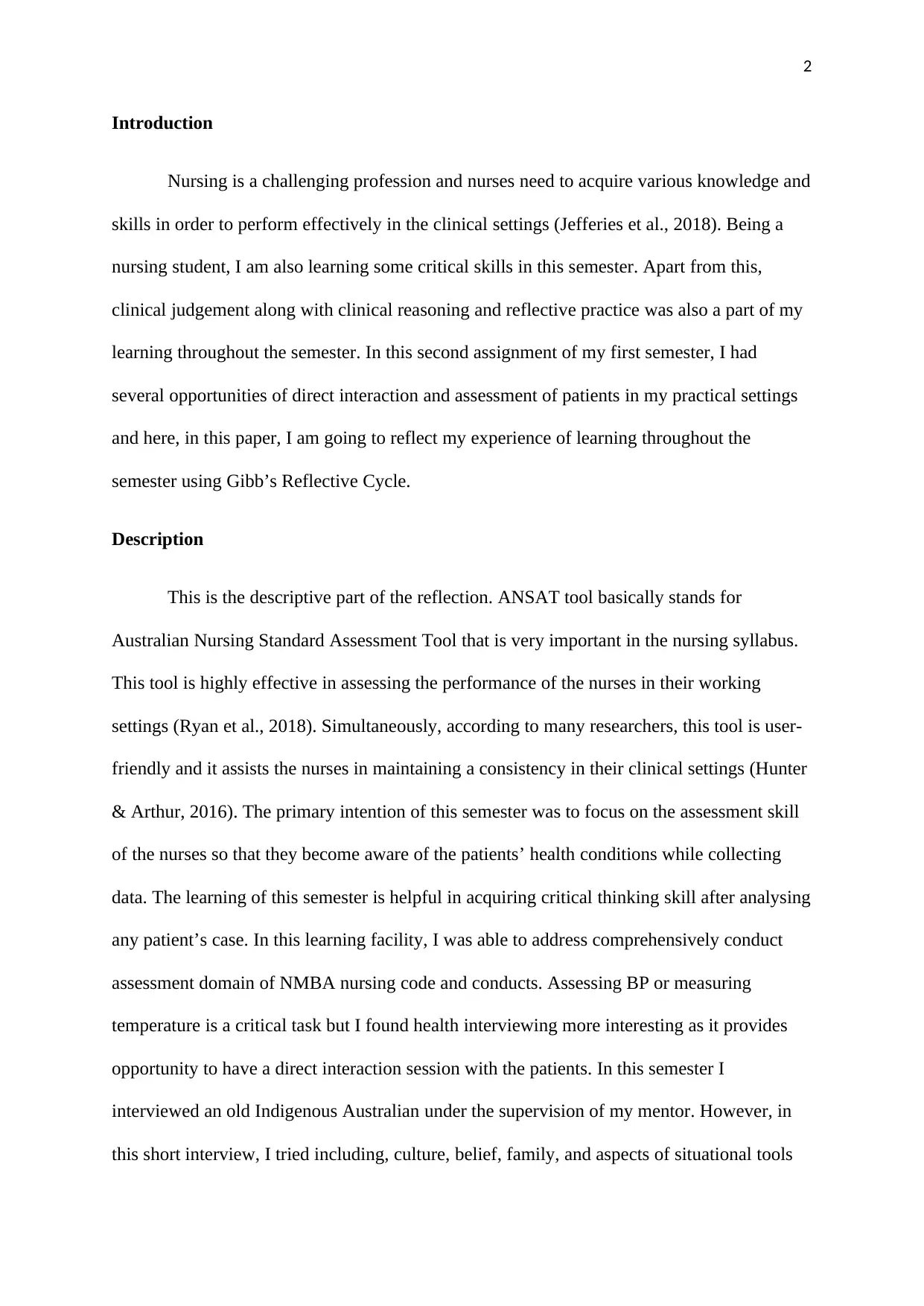
2
Introduction
Nursing is a challenging profession and nurses need to acquire various knowledge and
skills in order to perform effectively in the clinical settings (Jefferies et al., 2018). Being a
nursing student, I am also learning some critical skills in this semester. Apart from this,
clinical judgement along with clinical reasoning and reflective practice was also a part of my
learning throughout the semester. In this second assignment of my first semester, I had
several opportunities of direct interaction and assessment of patients in my practical settings
and here, in this paper, I am going to reflect my experience of learning throughout the
semester using Gibb’s Reflective Cycle.
Description
This is the descriptive part of the reflection. ANSAT tool basically stands for
Australian Nursing Standard Assessment Tool that is very important in the nursing syllabus.
This tool is highly effective in assessing the performance of the nurses in their working
settings (Ryan et al., 2018). Simultaneously, according to many researchers, this tool is user-
friendly and it assists the nurses in maintaining a consistency in their clinical settings (Hunter
& Arthur, 2016). The primary intention of this semester was to focus on the assessment skill
of the nurses so that they become aware of the patients’ health conditions while collecting
data. The learning of this semester is helpful in acquiring critical thinking skill after analysing
any patient’s case. In this learning facility, I was able to address comprehensively conduct
assessment domain of NMBA nursing code and conducts. Assessing BP or measuring
temperature is a critical task but I found health interviewing more interesting as it provides
opportunity to have a direct interaction session with the patients. In this semester I
interviewed an old Indigenous Australian under the supervision of my mentor. However, in
this short interview, I tried including, culture, belief, family, and aspects of situational tools
Introduction
Nursing is a challenging profession and nurses need to acquire various knowledge and
skills in order to perform effectively in the clinical settings (Jefferies et al., 2018). Being a
nursing student, I am also learning some critical skills in this semester. Apart from this,
clinical judgement along with clinical reasoning and reflective practice was also a part of my
learning throughout the semester. In this second assignment of my first semester, I had
several opportunities of direct interaction and assessment of patients in my practical settings
and here, in this paper, I am going to reflect my experience of learning throughout the
semester using Gibb’s Reflective Cycle.
Description
This is the descriptive part of the reflection. ANSAT tool basically stands for
Australian Nursing Standard Assessment Tool that is very important in the nursing syllabus.
This tool is highly effective in assessing the performance of the nurses in their working
settings (Ryan et al., 2018). Simultaneously, according to many researchers, this tool is user-
friendly and it assists the nurses in maintaining a consistency in their clinical settings (Hunter
& Arthur, 2016). The primary intention of this semester was to focus on the assessment skill
of the nurses so that they become aware of the patients’ health conditions while collecting
data. The learning of this semester is helpful in acquiring critical thinking skill after analysing
any patient’s case. In this learning facility, I was able to address comprehensively conduct
assessment domain of NMBA nursing code and conducts. Assessing BP or measuring
temperature is a critical task but I found health interviewing more interesting as it provides
opportunity to have a direct interaction session with the patients. In this semester I
interviewed an old Indigenous Australian under the supervision of my mentor. However, in
this short interview, I tried including, culture, belief, family, and aspects of situational tools
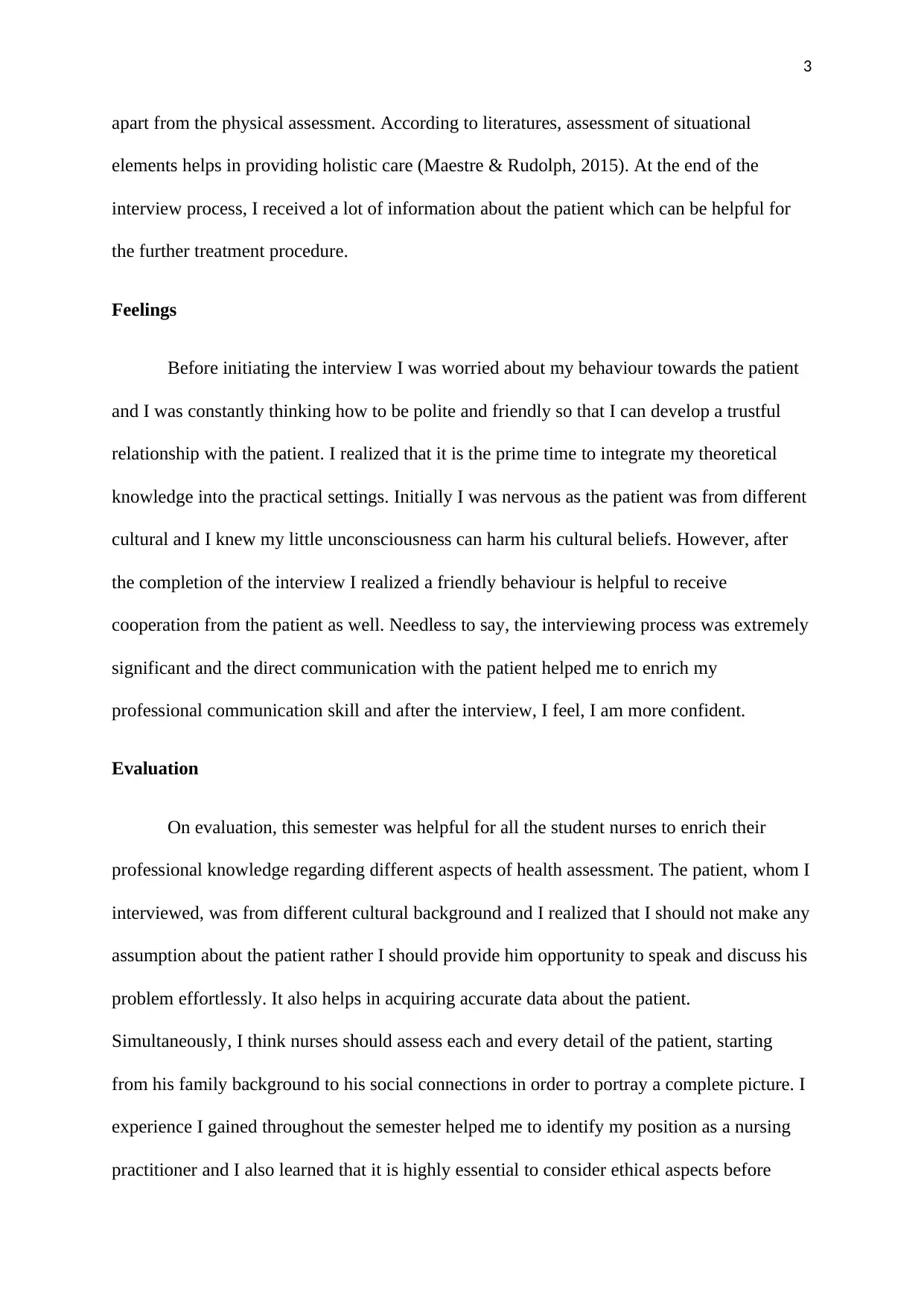
3
apart from the physical assessment. According to literatures, assessment of situational
elements helps in providing holistic care (Maestre & Rudolph, 2015). At the end of the
interview process, I received a lot of information about the patient which can be helpful for
the further treatment procedure.
Feelings
Before initiating the interview I was worried about my behaviour towards the patient
and I was constantly thinking how to be polite and friendly so that I can develop a trustful
relationship with the patient. I realized that it is the prime time to integrate my theoretical
knowledge into the practical settings. Initially I was nervous as the patient was from different
cultural and I knew my little unconsciousness can harm his cultural beliefs. However, after
the completion of the interview I realized a friendly behaviour is helpful to receive
cooperation from the patient as well. Needless to say, the interviewing process was extremely
significant and the direct communication with the patient helped me to enrich my
professional communication skill and after the interview, I feel, I am more confident.
Evaluation
On evaluation, this semester was helpful for all the student nurses to enrich their
professional knowledge regarding different aspects of health assessment. The patient, whom I
interviewed, was from different cultural background and I realized that I should not make any
assumption about the patient rather I should provide him opportunity to speak and discuss his
problem effortlessly. It also helps in acquiring accurate data about the patient.
Simultaneously, I think nurses should assess each and every detail of the patient, starting
from his family background to his social connections in order to portray a complete picture. I
experience I gained throughout the semester helped me to identify my position as a nursing
practitioner and I also learned that it is highly essential to consider ethical aspects before
apart from the physical assessment. According to literatures, assessment of situational
elements helps in providing holistic care (Maestre & Rudolph, 2015). At the end of the
interview process, I received a lot of information about the patient which can be helpful for
the further treatment procedure.
Feelings
Before initiating the interview I was worried about my behaviour towards the patient
and I was constantly thinking how to be polite and friendly so that I can develop a trustful
relationship with the patient. I realized that it is the prime time to integrate my theoretical
knowledge into the practical settings. Initially I was nervous as the patient was from different
cultural and I knew my little unconsciousness can harm his cultural beliefs. However, after
the completion of the interview I realized a friendly behaviour is helpful to receive
cooperation from the patient as well. Needless to say, the interviewing process was extremely
significant and the direct communication with the patient helped me to enrich my
professional communication skill and after the interview, I feel, I am more confident.
Evaluation
On evaluation, this semester was helpful for all the student nurses to enrich their
professional knowledge regarding different aspects of health assessment. The patient, whom I
interviewed, was from different cultural background and I realized that I should not make any
assumption about the patient rather I should provide him opportunity to speak and discuss his
problem effortlessly. It also helps in acquiring accurate data about the patient.
Simultaneously, I think nurses should assess each and every detail of the patient, starting
from his family background to his social connections in order to portray a complete picture. I
experience I gained throughout the semester helped me to identify my position as a nursing
practitioner and I also learned that it is highly essential to consider ethical aspects before
⊘ This is a preview!⊘
Do you want full access?
Subscribe today to unlock all pages.

Trusted by 1+ million students worldwide
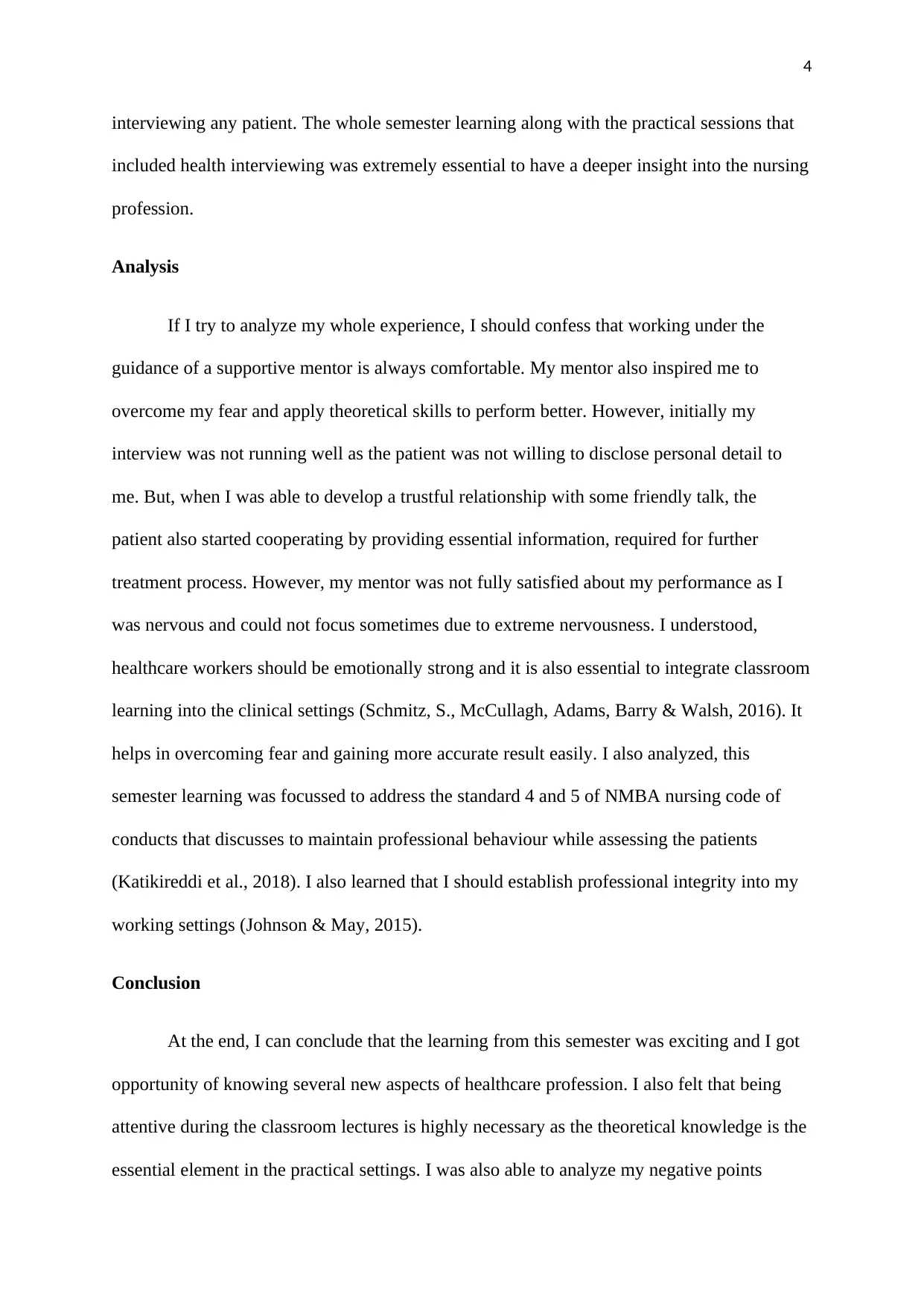
4
interviewing any patient. The whole semester learning along with the practical sessions that
included health interviewing was extremely essential to have a deeper insight into the nursing
profession.
Analysis
If I try to analyze my whole experience, I should confess that working under the
guidance of a supportive mentor is always comfortable. My mentor also inspired me to
overcome my fear and apply theoretical skills to perform better. However, initially my
interview was not running well as the patient was not willing to disclose personal detail to
me. But, when I was able to develop a trustful relationship with some friendly talk, the
patient also started cooperating by providing essential information, required for further
treatment process. However, my mentor was not fully satisfied about my performance as I
was nervous and could not focus sometimes due to extreme nervousness. I understood,
healthcare workers should be emotionally strong and it is also essential to integrate classroom
learning into the clinical settings (Schmitz, S., McCullagh, Adams, Barry & Walsh, 2016). It
helps in overcoming fear and gaining more accurate result easily. I also analyzed, this
semester learning was focussed to address the standard 4 and 5 of NMBA nursing code of
conducts that discusses to maintain professional behaviour while assessing the patients
(Katikireddi et al., 2018). I also learned that I should establish professional integrity into my
working settings (Johnson & May, 2015).
Conclusion
At the end, I can conclude that the learning from this semester was exciting and I got
opportunity of knowing several new aspects of healthcare profession. I also felt that being
attentive during the classroom lectures is highly necessary as the theoretical knowledge is the
essential element in the practical settings. I was also able to analyze my negative points
interviewing any patient. The whole semester learning along with the practical sessions that
included health interviewing was extremely essential to have a deeper insight into the nursing
profession.
Analysis
If I try to analyze my whole experience, I should confess that working under the
guidance of a supportive mentor is always comfortable. My mentor also inspired me to
overcome my fear and apply theoretical skills to perform better. However, initially my
interview was not running well as the patient was not willing to disclose personal detail to
me. But, when I was able to develop a trustful relationship with some friendly talk, the
patient also started cooperating by providing essential information, required for further
treatment process. However, my mentor was not fully satisfied about my performance as I
was nervous and could not focus sometimes due to extreme nervousness. I understood,
healthcare workers should be emotionally strong and it is also essential to integrate classroom
learning into the clinical settings (Schmitz, S., McCullagh, Adams, Barry & Walsh, 2016). It
helps in overcoming fear and gaining more accurate result easily. I also analyzed, this
semester learning was focussed to address the standard 4 and 5 of NMBA nursing code of
conducts that discusses to maintain professional behaviour while assessing the patients
(Katikireddi et al., 2018). I also learned that I should establish professional integrity into my
working settings (Johnson & May, 2015).
Conclusion
At the end, I can conclude that the learning from this semester was exciting and I got
opportunity of knowing several new aspects of healthcare profession. I also felt that being
attentive during the classroom lectures is highly necessary as the theoretical knowledge is the
essential element in the practical settings. I was also able to analyze my negative points
Paraphrase This Document
Need a fresh take? Get an instant paraphrase of this document with our AI Paraphraser
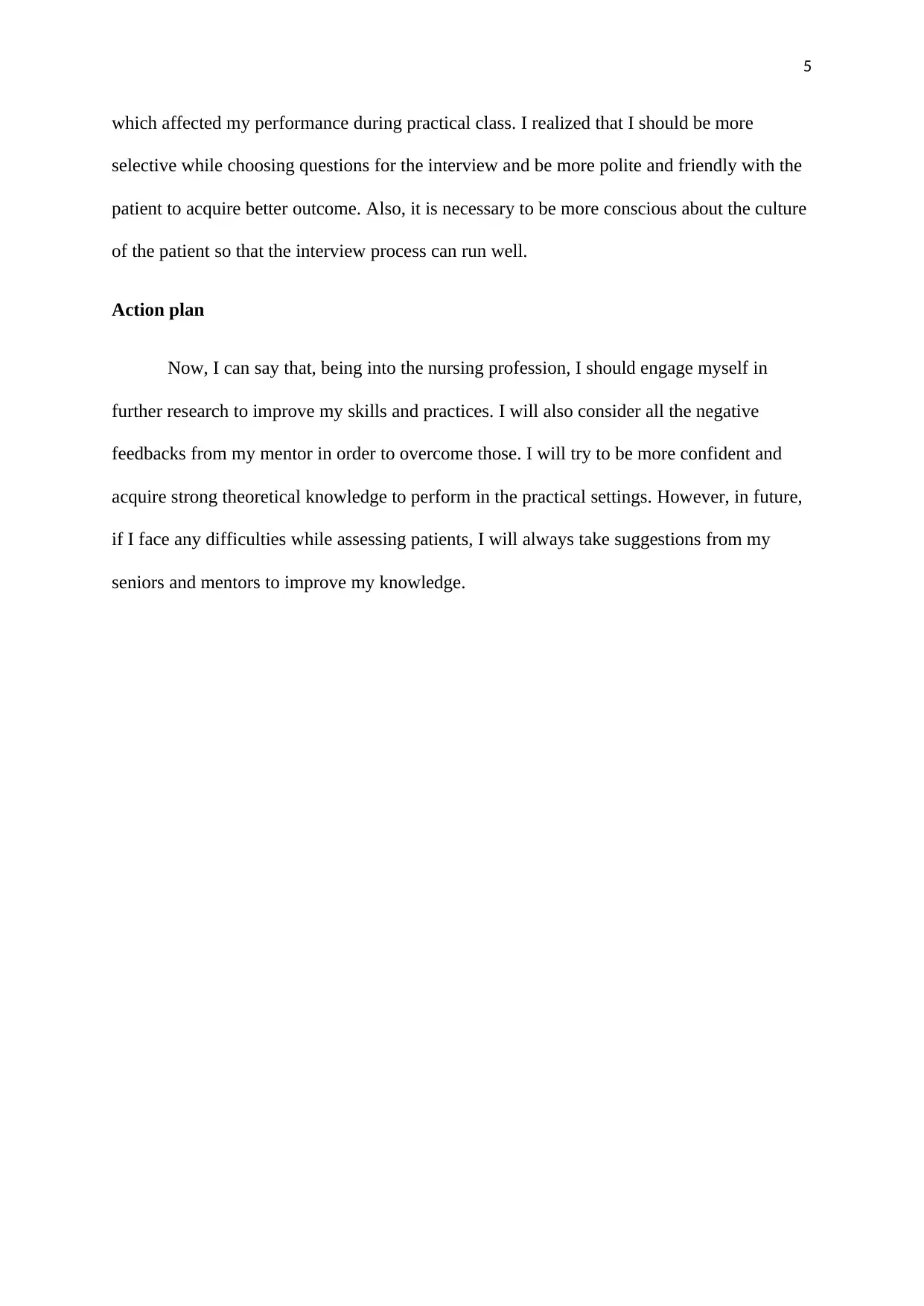
5
which affected my performance during practical class. I realized that I should be more
selective while choosing questions for the interview and be more polite and friendly with the
patient to acquire better outcome. Also, it is necessary to be more conscious about the culture
of the patient so that the interview process can run well.
Action plan
Now, I can say that, being into the nursing profession, I should engage myself in
further research to improve my skills and practices. I will also consider all the negative
feedbacks from my mentor in order to overcome those. I will try to be more confident and
acquire strong theoretical knowledge to perform in the practical settings. However, in future,
if I face any difficulties while assessing patients, I will always take suggestions from my
seniors and mentors to improve my knowledge.
which affected my performance during practical class. I realized that I should be more
selective while choosing questions for the interview and be more polite and friendly with the
patient to acquire better outcome. Also, it is necessary to be more conscious about the culture
of the patient so that the interview process can run well.
Action plan
Now, I can say that, being into the nursing profession, I should engage myself in
further research to improve my skills and practices. I will also consider all the negative
feedbacks from my mentor in order to overcome those. I will try to be more confident and
acquire strong theoretical knowledge to perform in the practical settings. However, in future,
if I face any difficulties while assessing patients, I will always take suggestions from my
seniors and mentors to improve my knowledge.
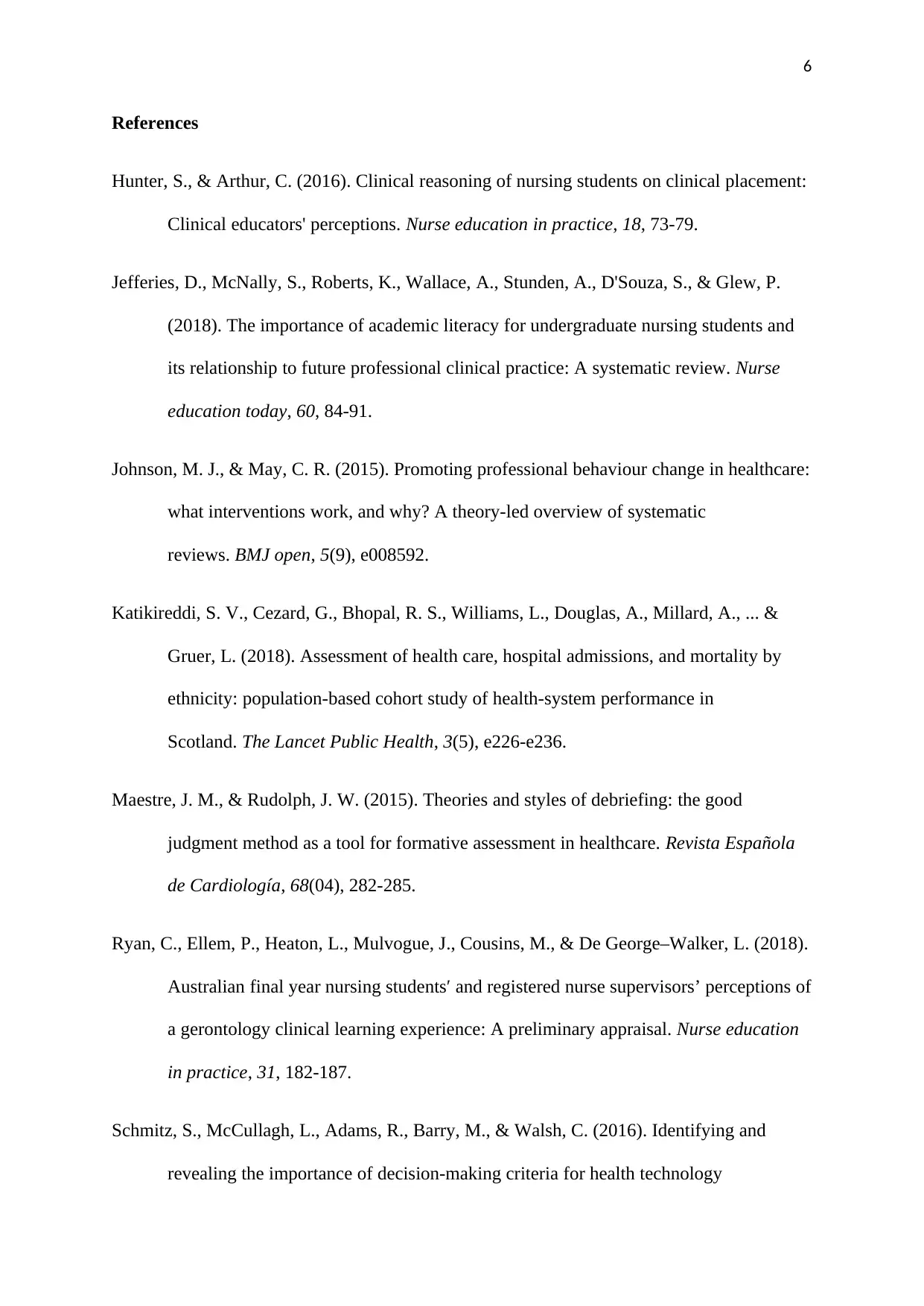
6
References
Hunter, S., & Arthur, C. (2016). Clinical reasoning of nursing students on clinical placement:
Clinical educators' perceptions. Nurse education in practice, 18, 73-79.
Jefferies, D., McNally, S., Roberts, K., Wallace, A., Stunden, A., D'Souza, S., & Glew, P.
(2018). The importance of academic literacy for undergraduate nursing students and
its relationship to future professional clinical practice: A systematic review. Nurse
education today, 60, 84-91.
Johnson, M. J., & May, C. R. (2015). Promoting professional behaviour change in healthcare:
what interventions work, and why? A theory-led overview of systematic
reviews. BMJ open, 5(9), e008592.
Katikireddi, S. V., Cezard, G., Bhopal, R. S., Williams, L., Douglas, A., Millard, A., ... &
Gruer, L. (2018). Assessment of health care, hospital admissions, and mortality by
ethnicity: population-based cohort study of health-system performance in
Scotland. The Lancet Public Health, 3(5), e226-e236.
Maestre, J. M., & Rudolph, J. W. (2015). Theories and styles of debriefing: the good
judgment method as a tool for formative assessment in healthcare. Revista Española
de Cardiología, 68(04), 282-285.
Ryan, C., Ellem, P., Heaton, L., Mulvogue, J., Cousins, M., & De George–Walker, L. (2018).
Australian final year nursing students′ and registered nurse supervisors’ perceptions of
a gerontology clinical learning experience: A preliminary appraisal. Nurse education
in practice, 31, 182-187.
Schmitz, S., McCullagh, L., Adams, R., Barry, M., & Walsh, C. (2016). Identifying and
revealing the importance of decision-making criteria for health technology
References
Hunter, S., & Arthur, C. (2016). Clinical reasoning of nursing students on clinical placement:
Clinical educators' perceptions. Nurse education in practice, 18, 73-79.
Jefferies, D., McNally, S., Roberts, K., Wallace, A., Stunden, A., D'Souza, S., & Glew, P.
(2018). The importance of academic literacy for undergraduate nursing students and
its relationship to future professional clinical practice: A systematic review. Nurse
education today, 60, 84-91.
Johnson, M. J., & May, C. R. (2015). Promoting professional behaviour change in healthcare:
what interventions work, and why? A theory-led overview of systematic
reviews. BMJ open, 5(9), e008592.
Katikireddi, S. V., Cezard, G., Bhopal, R. S., Williams, L., Douglas, A., Millard, A., ... &
Gruer, L. (2018). Assessment of health care, hospital admissions, and mortality by
ethnicity: population-based cohort study of health-system performance in
Scotland. The Lancet Public Health, 3(5), e226-e236.
Maestre, J. M., & Rudolph, J. W. (2015). Theories and styles of debriefing: the good
judgment method as a tool for formative assessment in healthcare. Revista Española
de Cardiología, 68(04), 282-285.
Ryan, C., Ellem, P., Heaton, L., Mulvogue, J., Cousins, M., & De George–Walker, L. (2018).
Australian final year nursing students′ and registered nurse supervisors’ perceptions of
a gerontology clinical learning experience: A preliminary appraisal. Nurse education
in practice, 31, 182-187.
Schmitz, S., McCullagh, L., Adams, R., Barry, M., & Walsh, C. (2016). Identifying and
revealing the importance of decision-making criteria for health technology
⊘ This is a preview!⊘
Do you want full access?
Subscribe today to unlock all pages.

Trusted by 1+ million students worldwide
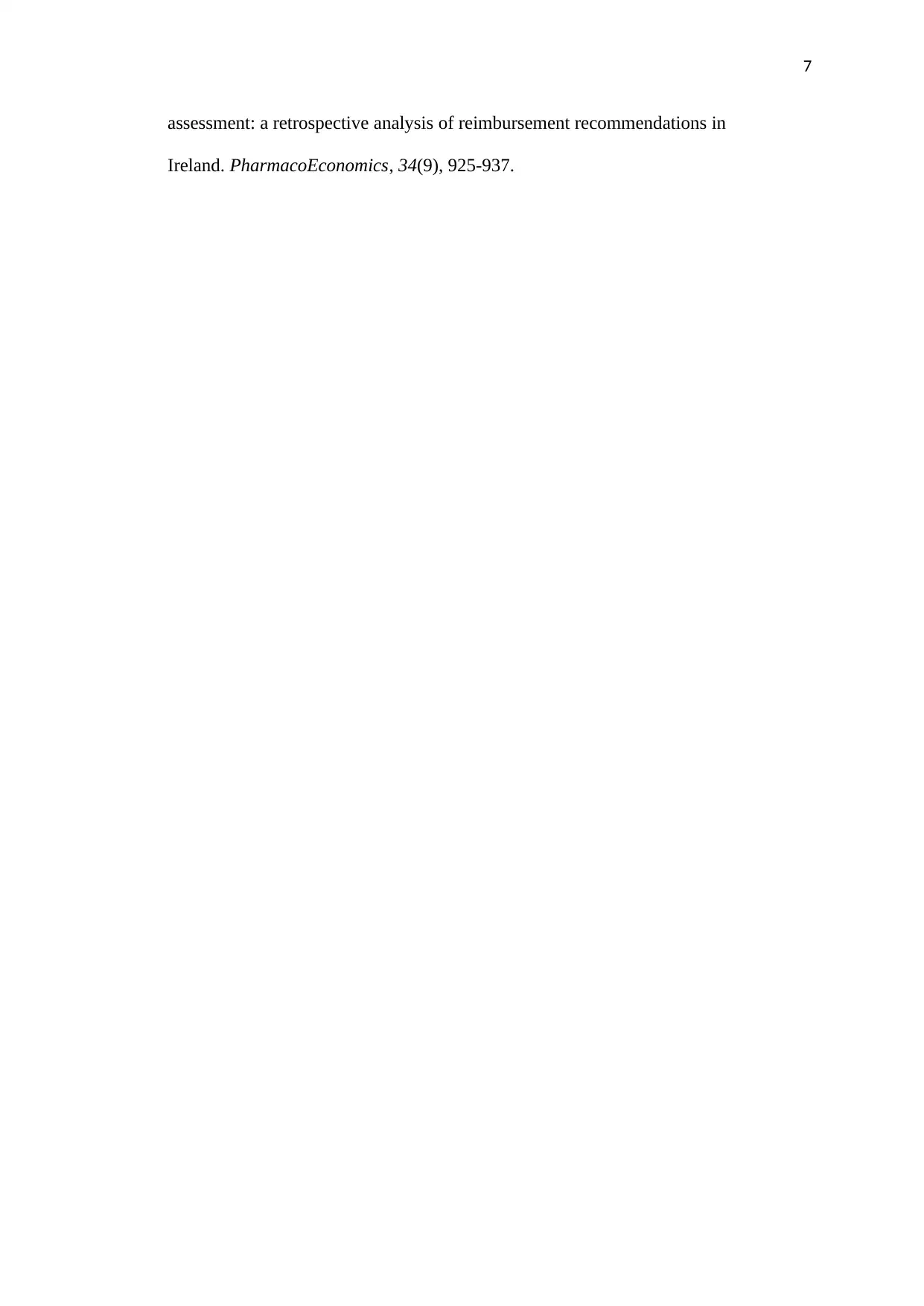
7
assessment: a retrospective analysis of reimbursement recommendations in
Ireland. PharmacoEconomics, 34(9), 925-937.
assessment: a retrospective analysis of reimbursement recommendations in
Ireland. PharmacoEconomics, 34(9), 925-937.
1 out of 7
Related Documents
Your All-in-One AI-Powered Toolkit for Academic Success.
+13062052269
info@desklib.com
Available 24*7 on WhatsApp / Email
![[object Object]](/_next/static/media/star-bottom.7253800d.svg)
Unlock your academic potential
Copyright © 2020–2026 A2Z Services. All Rights Reserved. Developed and managed by ZUCOL.





